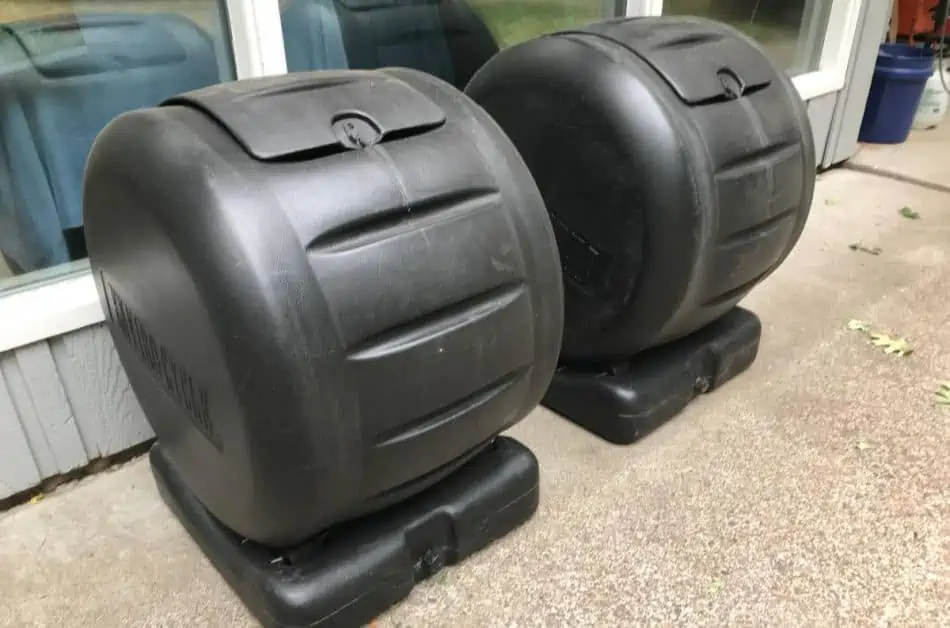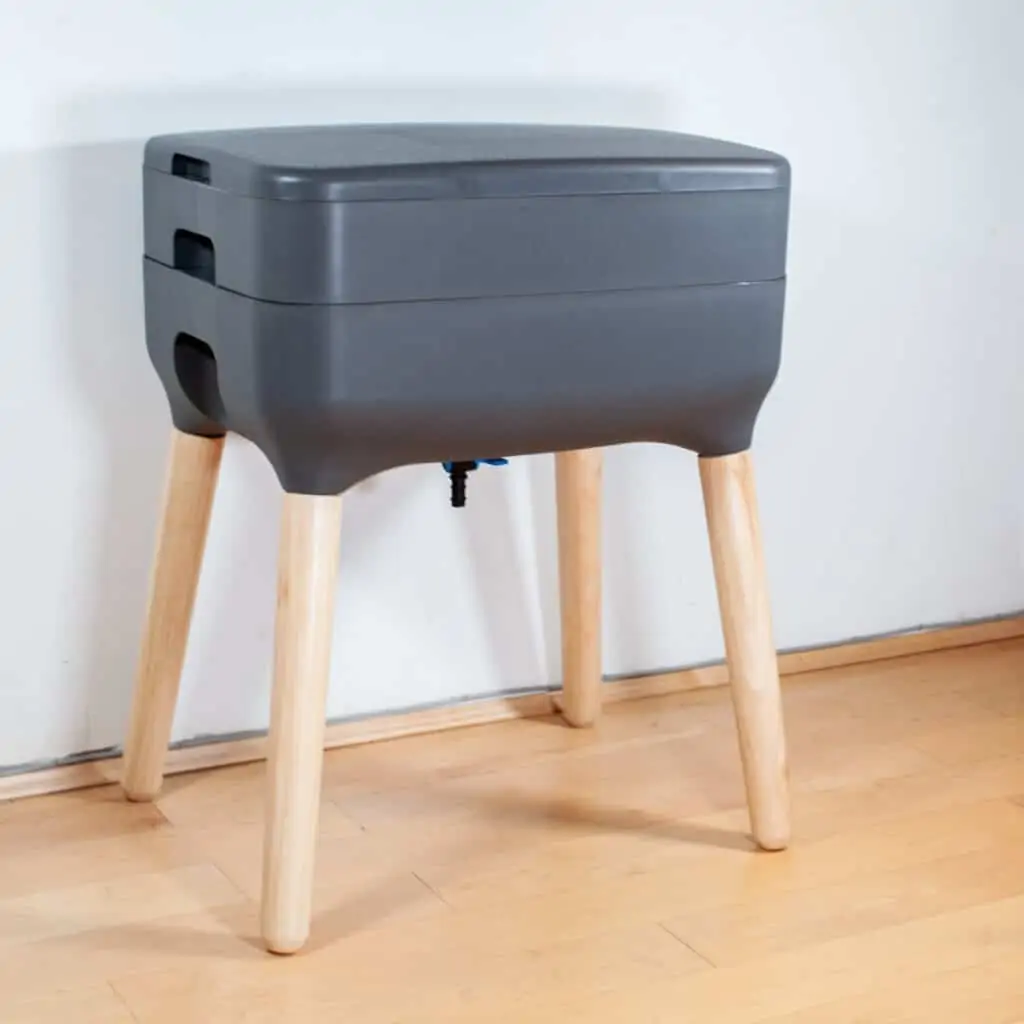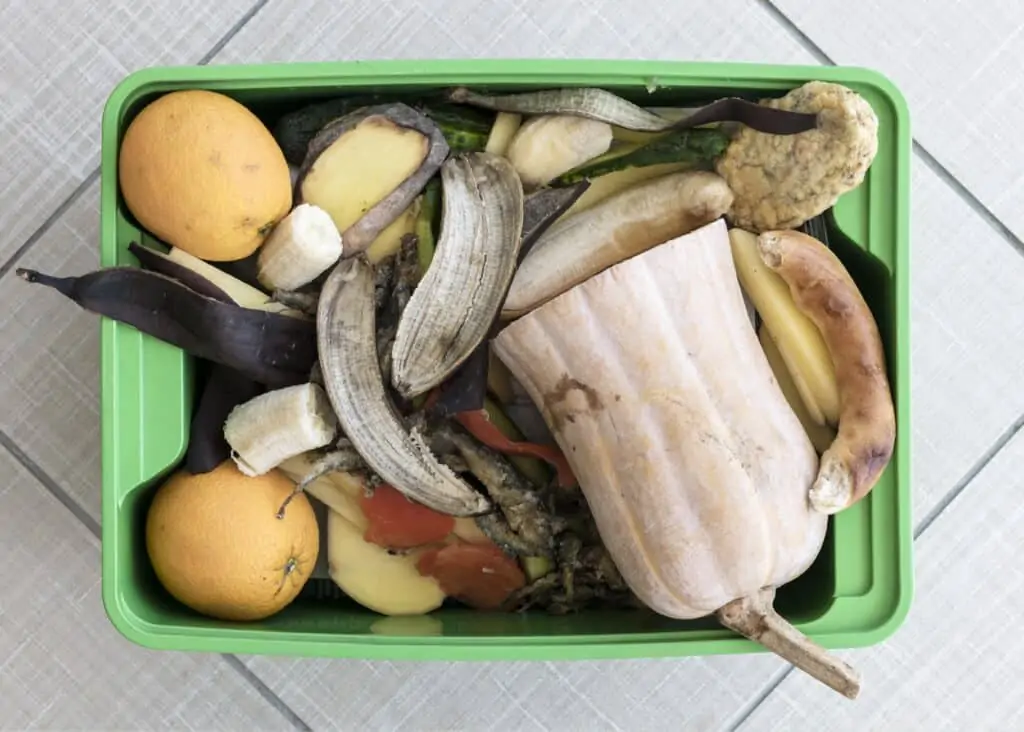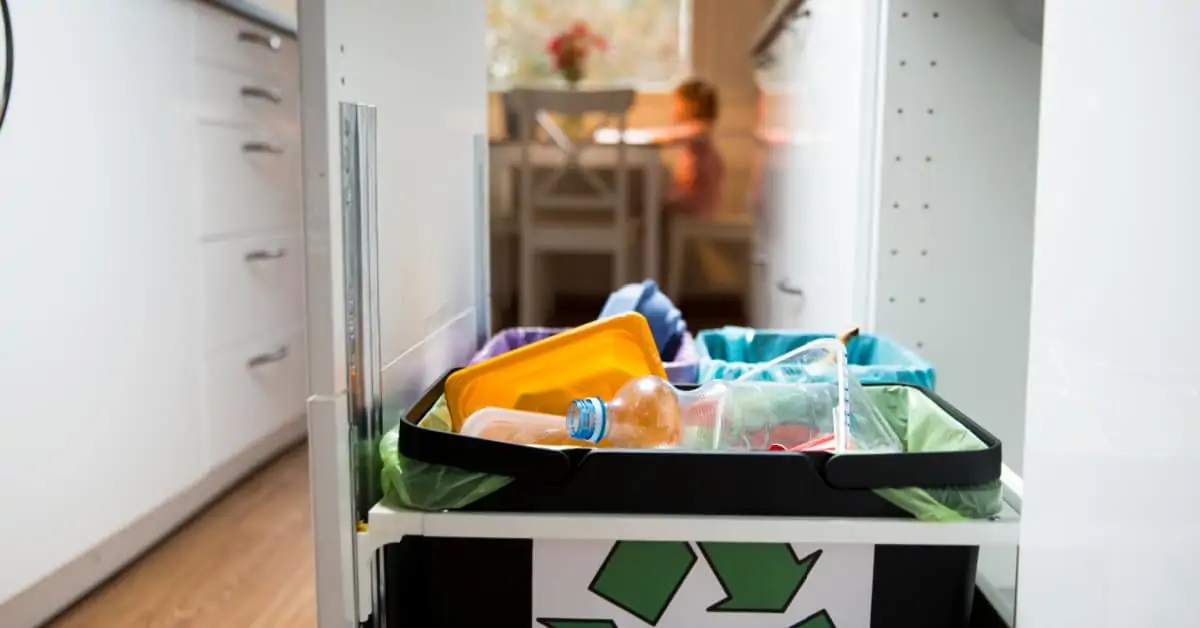As an Amazon Associate I earn from qualifying purchases.
There are several things we all want to do when we move into our first apartment. The problem is, you can’t do most of them. Paint the walls? Nope. Get a dog? Nope. Take out a wall? Nope. Composting? Heck yes!
Whether you have a community garden, window boxes, or a small plot in your mom’s backyard, having a dirt spot can add to the list of things that you need to do! Well here’s the good news. You can cross buying compost off the list because we’re going to make it ourselves.
Composting in an apartment is not only easy but it reduces waste and saves money.
As your waste bin keeps getting full, while your plants ask for nutrients, and your mind starts to yell in frustration about having to constantly throw things away you may start researching composting. Composting is an apartment is not an easy task, but it can be extremely rewarding.
Composting in an apartment is not too dissimilar to composting in a house, with the only difference being that you cannot create a system that takes months to decompose everything. Having a proper composting bin in your apartment will save tons of waste going to landfills and will give nutrient-rich soil for you to use for any plants you may be growing.
There are several things that you will need to start this process properly, with each one being just as important as the next. You need to know how to do this properly, what effect each step will have on your composting, and how long it will take for you to be able to use the compost. Many people learn through trial and error, which is always an important step to composting, as you will need to learn what can and cannot be composted.
How To Get Started Composting In An Apartment
A lot of people make the mistake of thinking that the requirements to start a good compost heap are extremely high and complicated. However, it is rarely true and most people have everything that they need lying around their house. When you are living in an apartment there are only a few things that you will need to buy to ensure that you are ready to start the process.
Each part that you need is important though and will require that you properly get all the right materials. Most compost bins that never properly work are simply missing one part or not receiving enough of another, with many people thinking a compost bin is used and forgetting. However, as you will learn compost bins require a lot of work and patience as you get the process started and for nature to easily do what is needed.
Compost Bin For An Apartment

This is the part that most people seem to find daunting, as they become increasingly confused about how complex a compost bin is. The compost bin is ironically one of the easiest parts of the entire process, you can buy them at most hardware or nursery stores as well. The compost bin can also be made out of old trash bins that you would have thrown out normally.
The most important thing to know about your compost bin is that it should be able to breathe, have a layering system that separates excess water from the compost, and that it should not be able to get too heated. Other than that, most shapes or sizes will work as a compost bin, the bin is there to keep the process going, ensuring that the worms are eating properly and getting everything, they need.
Composting Greens
When we talk about greens with compost we don’t mean only leaves and green vegetables, instead, we mean compostable materials that are easy to compost. These can be food scraps, old vegetables, fruits, and everything else that you may have eaten. Included with this are leaves and softer plant materials, each one being important as they will be the things that keep your compost bin running.
Greens are the materials that your compost bin can compost within a few weeks, sometimes even days, and not be affected negatively at all. Greens are the things that your earthworms will be living on, easily eating, and digesting, making the process of composting everything else significantly faster. Many greens will also have a large impact on the overall moisture levels in the bin as well.
Composting Browns
Browns are everything else you are adding to the compost bin, including of course dirt to make sure everything is mixed properly. Composting browns take a lot longer to break down and will even slow down the entire process within your compost bin. These can be anything from twigs, branches, harder leaves, or whatever else is in the garden refuse.
For apartments, this will mean papers and other harder waste that can be in the compost heap but won’t be gone within a few days. This is usually the part that you need to control the most, as these will and can kill the composting process within your compost bin, sucking up the moisture or killing the worms through starvation. Many people use less brown waste than they would ever use greens.
Adding Water To Compost
This is arguably the trickiest thing that you need to look at when you have a compost heap, as too much water will kill every living thing in the compost heap. While allowing the compost heap to be too dry will cause most of the bacteria and living creatures within the compost heap to experience extremely stunted growth.
You will need to have ways of controlling the overall moisture in the compost heap, either with a spritzer or ice blocks on top. This ensures that the compost is nice and moist, letting everything work as it should and giving the worms soft soil to move through as they look for new things to eat and devour.
Even though many people consider it an excellent source of moisture and nitrogen, peeing on your compost pile indoors is not something I’d recommend.
Composting With Worms In An Apartment
Possibly the thing that will keep you awake at night is the choice between going with or without worms for your apartment bin. Vermicomposting is one of the best ways to break down your waste in an apartment without creating a lot of smell.

However, the worms create a lot more waste that you will need to clean and take care of, along with requiring that you monitor the acidity, many times even giving worms away to ensure there aren’t too many. Worms make the process of composting a bit more complicated, and they are the reason that many people are afraid of starting.
The major drawing point of vermicomposting indoors is that the addition of worms does wonders to the speed at which you are composting. Most worms can eat natural waste within days, making space for every green piece of waste that you make throughout the week. While the worms can make even brown waste disappear if given time and food, worms are the powerhouses of the composting world.
What To Put A Worm Bin In An Apartment
When you have a bin, you might find yourself scratching your head about where you should start composting. Every composting lover will have their spot that they believe is the best, with a lot getting into arguments about why certain locations around the home are not the best. Even more surprising is how few people realize that their environment is the biggest thing that changes the location of the bin.
You need to know which the most common locations are to learn where you should be keeping your compost bins. Despite what many want to believe what you are putting in the bin, the temperatures in your apartment, and the overall humidity around you will greatly affect the perfect placement of your bin. The bin might be moved several times before you are entirely happy with its location, which is why you need to know the most basic locations to consider.
Option #1 – Your Kitchen Corner
Probably the first location that most people test their bins in before they ever get a proper area will be in a corner of the kitchen, located close to the waste bin. This is why so many people mistakenly think their bins aren’t working, as there might well be too much traffic and commotion for the bin. However, if you have a quiet corner in your apartment kitchen it very well may work perfectly for your bin to be started.

These corners need to have low foot traffic and no sunlight that shines on them, as even a few hours of sunlight in the morning can heat the top of the bin to such a level that the worms are staying away. If it is your first bin leaving it in the open where you can and will easily see when something is wrong is possibly the best thing you can do. This will teach you everything you need to know until you can create a cupboard or nook for the bin to be in permanently.
Option 2 – A Shadey Balcony
Many apartment owners that are considering compost bins have access to a private balcony on which they are more or less able to do what they want. This is why you should consider placing yours on the balcony, with a proper cover on top of it to ensure that the sun and birds cannot damage it. You will find that these bins are the ones that can be quite large and are effective in composting some of the toughest things out there.
The only thing you will need to be careful about is the heat in the summer and the cold in the winter as either extreme will easily kill the composting process in your bin. Balcony bins have the added benefit of not being in danger of adding a bad smell to your home when something does go wrong, which is likely to happen if it is your first compost bin. Several aspects make a compost bin on the balcony attractive, just remember that you will have to sacrifice some space for it.
Option 3 – A Purpose-built Cupboard
This is what you will probably have once you have the compost bin properly functional, a cupboard built just for the bin will ensure that it never sees too much sunlight, while ensuring that it is never too cold. Many compost bin owners that live in apartments quickly get a cupboard they may have used for storage and convert it into the compost cupboard. This ensures that they have a dedicated location for the bin that will consume all waste that would have taken time and energy to deal with otherwise.
When you are choosing a cupboard, you must ensure it is always easy to access and that there is no way for the cupboard to be overheated. This will create a location where your bin can happily stay for years without ever having to be defrosted or ice applied in emergency heat waves. When living in an apartment a good cupboard will always be the best location for your compost bin.
Turning Your Compost Bin In An Apartment
At the very least we recommend that you turn your apartment compost bin once a week, this will ensure that spacing is proper and that the bin is not too compact. However, ideally a compost bin, no matter its location, will be turned in every few days as this is the easiest and best way to ensure the bin and all its inhabitants are happy.
Turning the compost is a process where you mix up the bottom and top layers of the compost bin, while you remove the excess wastewater that the worms may have made. You mustn’t mix the most bottom layer with the top layers, as the soil you see at the bottom is your compost. A lot of first-time composters get confused as to what is compost that needs to be used for the plants and gardens.
When turning the compost heap there are several things you need to do, first of all, is to mix the top and middle layers, so that half-eaten and fresh things are together. While you are doing this, you should be removing the worms from the bottom-most layer and taking the compost they have made out. While emptying the wastebasket at the bottom of the bin that should be filled with dirty wastewater from the composting process.
9 Things You Can Compost In Your Apartment
Possibly the thing that has many people scratching their heads when they first have to add things to their compost bin is what exactly can go in. For apartments, this list is not nearly as long as the list for normal garden bins. You cannot leave a bin in an apartment for several months to do its thing, you need quick results that will allow you to constantly throw waste away.
To accomplish this, we need to ensure that you are using and throwing away only the easiest to decompose products. These are all things that will decompose naturally even without worms, but the addition of the worms will naturally make it a lot easier. We recommend keeping track of what you are throwing in as adding too many dry items will damage the process, while too many wet items will slow the process.
1. Tea
Everyone drinks tea at some point and we have learned that compost bins love it when you are adding tea leaves to them. The leaves are always soft and easy to decompose while the worms enjoy eating the smaller product. A lot of people like to add tea leaves simply to ensure that the compost consists of different materials.
2. Table Scraps
Possible the most fun thing to add to your compost heap, the table scraps that no one has eaten or the leftover food that is getting old. While you should be careful not to add too much, the compost bin, with or without worms, will gobble everything up within minutes. It is always important to have a proper set of table scraps ready for the compost heap to do its thing.
3. Shredded Paper
Considered brown waste, shredded paper is a good way to add some slower materials to the compost heap, especially if you are living alone and you do not have so many greens. The paper takes a bit longer to decompose, even when shredded, and will allow your worms to eat a bit of a variety, which is not important, but it is fun to think about.
4. Seaweed & Kelp
A lot of people think that sea plants cannot be added to normal compost bins, however, this is not true. As long as there is not too much saltwater with the seaweed or kelp you can easily just add them to the compost bin like anything else.
5. Newspaper
Unlike white shredded paper, the newspaper will dissolve super-fast in the compost bin and should be treated as something that will do so. Not good for creating layers, but a good way to slow the worms down just a little bit. However, as a newspaper are no longer popular you will find that the need to add them is very unlikely.
6. Leaves
When you have a lot of plants and things that you are growing, hopefully, faster with your compost, you will naturally be trimming them. Most leaves are considered greens and will be easy to decompose with your compost bin.
7. Fruits & Veggies
Whether they have been baked, cooked, grilled, or just gotten too old to use, most fruits and vegetables will be easy to decompose in your bin. Just ensure they are not too big or else the worms and bin will take quite a while to properly have everything decompose.
8. Coffee Grounds
Possibly the most important thing that you can add to your compost bin is the coffee grounds you are most likely to pile up throughout the week. These grounds add quite a bit to the ecology of the bin, not least of which is acidity, which can be counteracted with normal eggshells.
9. Cardboard
Most likely something that you are scratching your head when living in an apartment, but you can easily and comfortably use cardboard as a dividing layer for your compost bin. Many people use them because they do decompose, albeit slowly, without needing to be removed at a later time.
The Benefits Of Composting In An Apartment
It is estimated that around 25% of all things in a landfill can be composted in a bin, which is why you should be composting. The simple answer is that even if you have no plans to take care of you can use the compost bin to save yourself time and money. The compost bin will cost almost nothing to run and will mean you have to throw out the trash a lot less.
Composting, no matter where you are in the world, will mean that you are reducing the overall greenhouse gas effect you are having on the planet. While it may not be nearly as much as some of the larger corporations out there, every little bit that reduces our impact on this planet will help. This is why you should be ensuring that your bin is always working properly, even when you are living in an apartment with barely enough space for a couch.
Many people would like to think that composting is only for those who have vegetable gardens, or large lawns, however, it is something we should all be doing. If you do not grow any plants, you may have some neighbors and friends that would be more than happy to have your compost, as it usually costs them quite a bit of money to get good compost. Remember, the bins are some of the most versatile things you can find in the world.
What To Do With The Finished Compost
Once you have the bin properly running, the worms are happy and the greens are disappearing within days of you adding them, you will need to start moving to the next step. What to do with the compost you are now creating, this is something that catches many apartment owners off guard as they are not always able or allowed to grow large gardens.
This is why you should be aware of the things you can do, with many compost bin owners not ever using the compost themselves. Instead, they provide the compost to friends and neighbors that happily use them to feed their plants, as buying proper compost can be a headache. Your compost is one of the most naturally amazing composts that you can find, with a lot of people not always aware of how well plants will start to grow.
If you even have a few small potted plants they can happily and easily benefit from topsoil that is made from your compost, with many bonsai tree owners actively making compost for the same reason. Compost is one of the most versatile and sought-after things to make a garden flourish when it has not been flourishing before, with a great many dead plants rejuvenated from the nutrients from a layering of compost.
Conclusion
A compost bin in your apartment will mean that you are enjoying a great deal of the natural processes that the planet has to offer. The worms you are growing may very well become as important to you as a dog would normally be to a pet owner. Every step you are making to get a proper compost bin will greatly increase your overall mood, even if it is just because you found something to do.
Though, please remember, that you can have too many compost bins, especially in an apartment!
Other Posts You’ll Enjoy
Can You Compost Oats? (A Guide to Oatmeal and Oat Products)
At A GlanceYes, you can compost oats and oatmeal as they are organic materials that…
Can You Compost Oil? (Yes, but only a little…)
At A GlanceIt’s not recommended to compost oil as it can cause several issues in…
Composting Nectarine Pits – What You Need to Know
At A GlanceComposting nectarine pits can be a bit challenging due to their hard and…
Composting Newspaper with Color Ink – What You Need to Know
At A GlanceYes, you can compost newspaper with color ink, but it’s preferable if the…
Can You Compost Noodles? A Starchy Foods Composting Guide
At A GlanceYes, you can compost noodles as they are a biodegradable organic matter. Whether…
Can You Compost Nut Shells? (Yes…but probably don’t…)
At A GlanceYes, you can compost nut shells, but there are certain considerations to be…

